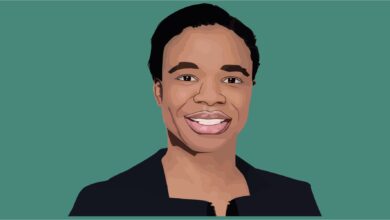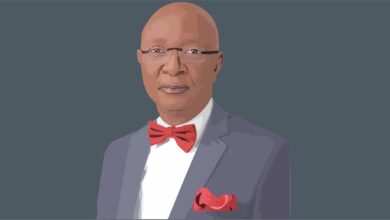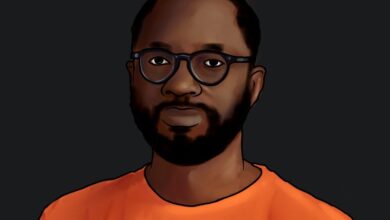The Lunch Hour – Biola Alabi, Founder Biola Alabi Media

I would have to say work ethic and discipline are things that have guided me through my career. I think these are pillars of success. I think there are a lot of people that are actually talented but have made sub-optimal progress in their careers because they are not sufficiently hardworking or disciplined.
Biola Alabi is an entrepreneur, filmmaker, investor, public speaker and television host. Prior to founding Biola Alabi Media, she held one of the biggest jobs in the African entertainment industry as Managing Director for M-Net Africa, part of the Naspers Group, a global technology and entertainment giant. Biola had previously worked in entertainment and marketing in the United States of America, in the executive team of the iconic Sesame Street and as a member of the marketing team that launched the Korean motor vehicle corporation Daewoo in the USA. Her outfit, Biola Alabi Media, is a fast-rising consultancy and production company with expertise in strategic consulting for pay entertainment, digital television, interactive television and emerging entertainment distribution platforms. The company services governments, content creators, telecommunication industry and investors in the converging media technology space. Biola is the Executive Producer of the highly 2018 movie Lara and the Beat and 2017 Nollywood blockbuster, Banana Island Ghost (B.I.G). She is also the Executive producer of Nigeria’s top food travel documentary series Bukas and Joints that is currently airing across Africa and in the USA. She is the founder of “Grooming for Greatness” a leadership development and mentorship programme for a new generation of African leaders. Bola Alabi has been named one of the 20 Youngest Power Women in Africa by Forbes Magazine (2012), a World Economic Forum Young Global Leader (2012) and CNBC Africa’s AABLA West African Business Woman of the Year (2013). She has a Bachelor of Arts from the University of Cincinnati and has over the years honed her business management skills through Executive Education programmes at elite institutions such as Harvard University’s Kennedy School of Government and Yale University’s Jackson Institute of Global Affairs. From August to December 2014, she participated in The Yale World Fellows Flagship Program. Biola is a frequent speaker at global forums on the African creative arts industry and Nollywood, sharing ideas on investment in infrastructure and strategies to upgrade skills.
University, Arts or Science?
I graduated with a degree in community and public health. The plan was to either move on to medical or pharmaceutical school. My parents, at the time, were very clear about what they expected from us. They were interested in engineering and medicine and felt those were very safe career paths for us. Most of my siblings were therefore on the path of sciences but changed their paths halfway through. I also later found out that I wasn’t really interested in pursuing medicine or pharmacy as a career. While working in public health, I moved on into marketing and other commercial ventures.
Biggest lesson from University?
I would say independence and decision-making. You really drive your learning as a student in the US by deciding on your major and other related things. I also learnt how to ask for help, because I also had to try to find resources like scholarships and help from others to get through the programme. It really felt like a lot of responsibility at the time and I think this experience was valuable later in my career because you need to learn independence and decision-making as a professional but always be able to ask for help when you need it.
In view of how how your career has played out, what advice would you have given to Biola Alabi when she was just entering college or graduating?
I would tell my younger self not to be so worried about the future. I think the younger me was a little anxious. Things usually work themselves out.
First big lesson in the workplace?
I had two jobs in my first summer of working before college. I worked at McDonald’s and at an ice cream shop. At the time, I was motivated to save up to buy a car. The first big lesson was time management. At McDonald’s, I learnt a lot about people by engaging customers. You also learn discipline because it is a very process-driven organisation. I also had to go to my ice cream job in the evening so I really had to learn discipline and develop a work ethic.
Things that you have learnt in your career that are not taught in the classroom?
Again, I would have to say work ethic and discipline are things that have guided me through my career. I think these are pillars of success. I think there are a lot of people that are actually talented but have made sub-optimal progress in their careers because they are not sufficiently hardworking or disciplined.

Also Read: The Lunch Hour – Biola Matesun, Founder and CEO, MalekFoto Films
Bigger influence, Mom or Dad?;
Both parents were very hardworking and disciplined but they were always extremely supportive. There were high expectations but I still felt like my parents were in my corner no matter what happened. I think that assurance is important for young people. Love and security motivate you to take more risk.
What type of music do you like?
I have a very eclectic taste in music. I love jazz, Afrobeat, opera, etc. I also love Broadway.
Your interest in books?
Growing up, I tended to read anything I could find. I read to manage time so I always hold on to a book wherever I go. When it comes to business books, I tend to read material written by Jim Collins like Good to Great, How the Mighty Fall etc.
So what are you reading now?
Girl, Woman, Other by Bernadine Evaristo. A fictional story that has won a bunch of awards; it explores themes of feminism, politics, patriarchy, success, and relationships.
Your best boss ever?
I have been blessed with so many amazing bosses but I will mention three. John Bates, my boss at Bigwords, an e-commerce company. He was the first boss that taught me about kindness in the workplace. That’s a big lesson that I have carried with me. Another good boss I had was Anita Steward, who I worked with at Sesame Street. She helped me find my marketing and sales side. She was a great marketer but also very personable with people. She taught me everything I know about sponsorship, client management, networking, and building win-win relationships. She pushed my name forward for opportunities within the firm even when I thought I wasn’t ready. Patricia Van Royen was another valuable boss but quite different from all the others. She allowed me to be very independent and gave me the confidence to thrive in subsequent endeavors. This helped me grow as an entrepreneur. The learnings from working with these people helped me be a better person, employee and boss.
What has been the biggest lesson that you have learnt as a boss?
When it is time for people to go, you have to let them go and also learn how to manage that process. You should also keep asking the people that you work with or that work for you what they want and ensure they are always motivated. I have also learnt how to be supportive and show gratitude, if people do something, recognize and appreciate their contribution. The world may feel like a very big place and you will never see people again, but it really is very small. It’s important to learn to build and maintain relationships.
If you could change anything about your career, looking back, what would it be?
The narrative that sort of pigeonholes me into the media space. I would like to think of myself as more than just a media entrepreneur. I am delighted at the opportunity to make a broader contribution to business and society through my experience on the board of non-media companies. However, I am also proud of what I have achieved in media, so it’s all good.

What’s your view on the new normal after Covid-19, especially as it relates to your industry?
I think the media and entertainment industry has been heavily impacted, especially on the production side, but I also think that consumption of the product has increased. The technology platforms that are available are helping us discover more amazing talent. Over the long term, I think that the industry will rebound and consumption is going to change. However, I also think that traditional platforms will remain relevant once we feel safe and secure again. So, it may be a long way to recovery and we must try to lift each other up, but I think that the human need to connect and consume stories will sustain the industry in the future.
Also Read: The Lunch Hour – Andrew Alli, CEO & Partner at Southbridge Group
Things you value the most in a candidate when hiring?;
I think a skill I bring to every role is my ability to build great teams. To do that, you have got to be good at assessing your team member’s attitude and aptitude. You have got to assess your people’s ability to adapt to change because some people are not good at that. You have got to make sure that even when you bring on stars into your team, they fit well so they don’t become toxic for the bigger team. It’s not always easy to find the balance.
What’s your favourite place to go in Nigeria and abroad?
In Nigeria, I love cultural events, so Terra Kulture in Lagos is one of my favourite places to go here. Abroad, I love Tokyo. I use to live in Seoul, Korea in the past and Tokyo, Japan was my favourite place to travel to for a vacation. Japanese food and culture are just amazing. It is also one of the safest places for travelers.
Any interest in sports?
I don’t really watch sports a lot but I am into fitness. So I walk, do pilates, yoga, and other things.
Best use of money ever for you.
I would say travel. I have never regretted travelling. It has unlocked so many opportunities. Living in Asia for a while was a very eye-opening experience.
Who would you like to spend a holiday with?
I always find that holidays with the extended family are never replaceable. I love to discover new places with my parents, husband and siblings. It may be frustrating to organize but it’s always very enjoyable.
Your thoughts about the future?
I have always believed that early childhood education is critical in human development. I think that we must focus on human development indices because they will determine the future of nations. I really hope Africa can do this. I think that investments in tertiary education provide the least return for society. The way we treat Mother Nature will also determine how we live in the future. So I hope that conversations around climate change will become more important in the future.
What would be your biggest advice to President Buhari if you ran into him at a restaurant?
The first thing I hope I can discuss with him is to draw his attention to managing our population better. I really feel that he is perhaps the best President that we have had in a long time that can address this critical issue. To lift people out of poverty, we need to have a policy on population growth, educate people on family planning if we are going to improve our human development index. I would also highlight the importance of diversifying our economy by harnessing the creative power of the population. The government should spend more money to make economic activities around the creative industries more viable and sustainable.
The Lunch Hour was over a zoom meeting because of the restrictions on public gathering due to the Covid-19 outbreak in Nigeria.







